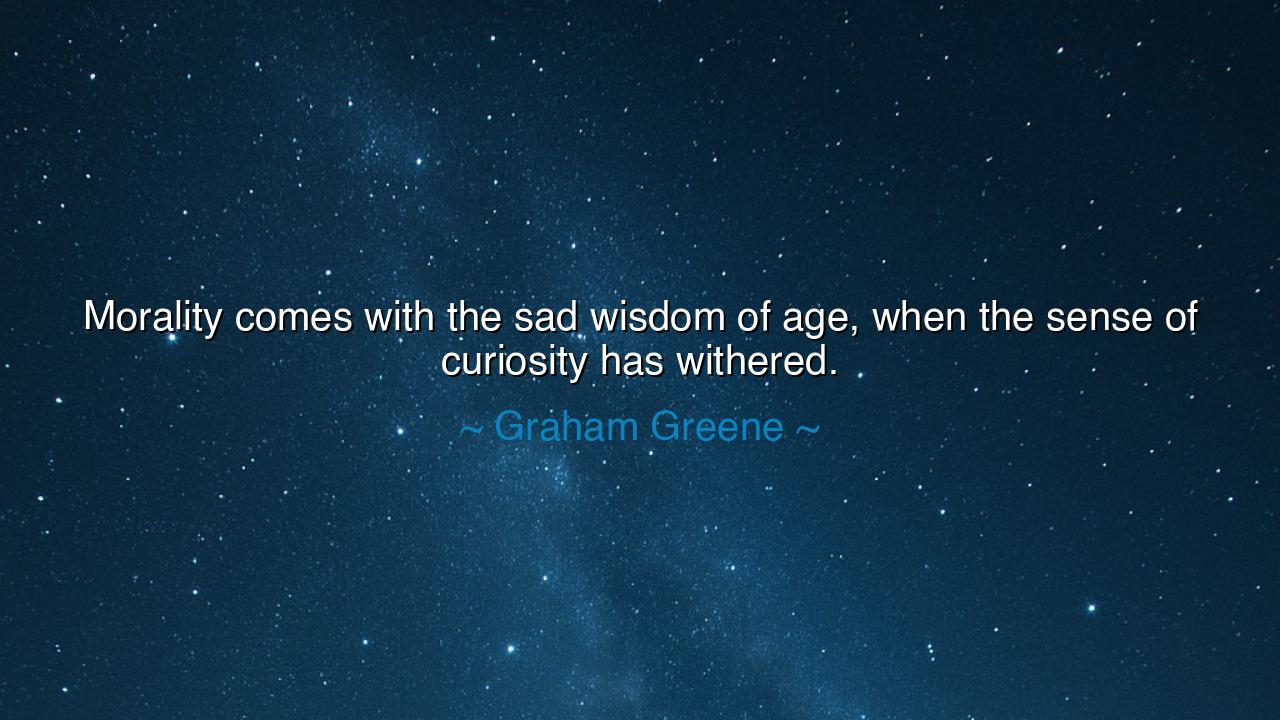
Morality comes with the sad wisdom of age, when the sense of






The novelist and moral philosopher Graham Greene, whose pen cut deep into the conscience of the twentieth century, once wrote: “Morality comes with the sad wisdom of age, when the sense of curiosity has withered.” In this single line, Greene captures the profound tension between youth and age, between the fiery yearning to know and the quiet resignation to what is. His words are both mournful and wise, for they reveal that morality, that disciplined sense of right and wrong, often blooms only when the wild flower of curiosity begins to fade. The young, in their hunger for experience, test every boundary; the old, having crossed too many, learn at last which lines were sacred.
The origin of this quote lies in Greene’s lifelong meditation on human frailty. Throughout his novels — from The Power and the Glory to The Heart of the Matter — he wrestled with the paradox of sin and salvation, temptation and virtue. Greene himself was a man of restlessness, a traveler, a seeker, one who wandered through war zones and brothels as readily as through cathedrals. He knew firsthand that the moral sense does not descend upon the young like a gift, but arises painfully from the ashes of experience. His words speak of that moment when one’s curiosity — once reckless, boundless, and naïve — gives way to reflection, and one learns, at last, the cost of having lived too freely.
To understand Greene’s meaning, we must see morality not as a rulebook, but as a form of wisdom purchased through loss. In youth, curiosity is our guiding flame — it drives us to explore, to question, to challenge the limits imposed by family, faith, and society. It is a sacred energy, yet one that burns without thought of consequence. The young are drawn to the edge of experience; they crave knowledge not merely of the world, but of themselves. Yet in the pursuit of this knowledge, they often stumble into sorrow, betrayal, and regret. When the flames of curiosity cool, what remains is the ember of understanding — the painful realization that freedom without conscience brings suffering. It is then, in that quiet after the storm, that morality arises — not as a command, but as compassion.
History gives us many examples of this transformation. Consider the life of Leo Tolstoy, the great Russian writer. In his youth, he was a man of unbridled curiosity — a soldier, a lover, a seeker of pleasure and glory. He lived wildly, heedless of moral restraint, driven by the hunger to taste every facet of life. But as he aged, the fires of curiosity dimmed, and the weight of his experiences pressed upon him. He turned inward, seeking truth beyond desire. In his later years, he renounced wealth, rejected vanity, and devoted himself to simplicity, peace, and the moral awakening of the human soul. His curiosity had not died; it had transformed — from the thirst for experience to the longing for meaning. In the fading of youthful desire, morality took root.
Greene’s words also reveal a deep sorrow. For in the “sad wisdom of age,” there is loss — the loss of wonder, of the raw passion that once made life so vivid. To become moral, in Greene’s sense, is to have suffered enough to know restraint. The heart grows cautious where once it was bold, weary where once it was wild. The old no longer ask, “What if?” but rather, “Why risk it?” And yet, this sadness is not without grace. It is the price of consciousness. The soul that has endured the consequences of its own curiosity becomes gentle, merciful. It ceases to judge others harshly, for it knows too well the weakness of flesh and the burden of guilt. Thus, morality is born not from purity, but from compassion shaped by experience.
But Greene’s warning is clear: beware the death of curiosity, for without it, life loses its brightness. There is a kind of moral stagnation that masquerades as virtue — when the aged, having lost their appetite for exploration, mistake fatigue for wisdom. True morality does not demand that curiosity die, but that it be transformed — refined into empathy, guided by discernment. The wise are not those who have ceased to wonder, but those whose wonder has matured beyond self-interest. The curiosity of youth asks, “What can I gain?”; the curiosity of age asks, “What can I give?” This is the sacred evolution Greene gestures toward — the shift from the restless self to the compassionate soul.
The lesson, then, is this: do not curse the restlessness of youth, nor worship the caution of age. Each has its season, and both are teachers. From curiosity, we learn courage; from morality, we learn mercy. The path of life demands both — the daring to explore and the wisdom to return home. As you grow older, let your curiosity not wither, but deepen; let it turn inward, toward understanding rather than indulgence. Seek not to extinguish desire, but to ennoble it — to make it serve the good rather than the self. In this way, you will unite the fire of youth with the wisdom of age.
Thus remember, O traveler of life, that morality is not the enemy of curiosity, but its evolution. The child wonders at the world; the adult learns to wonder at the soul. Do not fear the sadness that comes with wisdom, for it is the sign that you have lived deeply. Carry both the flame of curiosity and the lamp of morality, and walk with balance through the twilight of your years. For only the one who has both explored and understood can truly say: I have lived, and I have learned.






AAdministratorAdministrator
Welcome, honored guests. Please leave a comment, we will respond soon